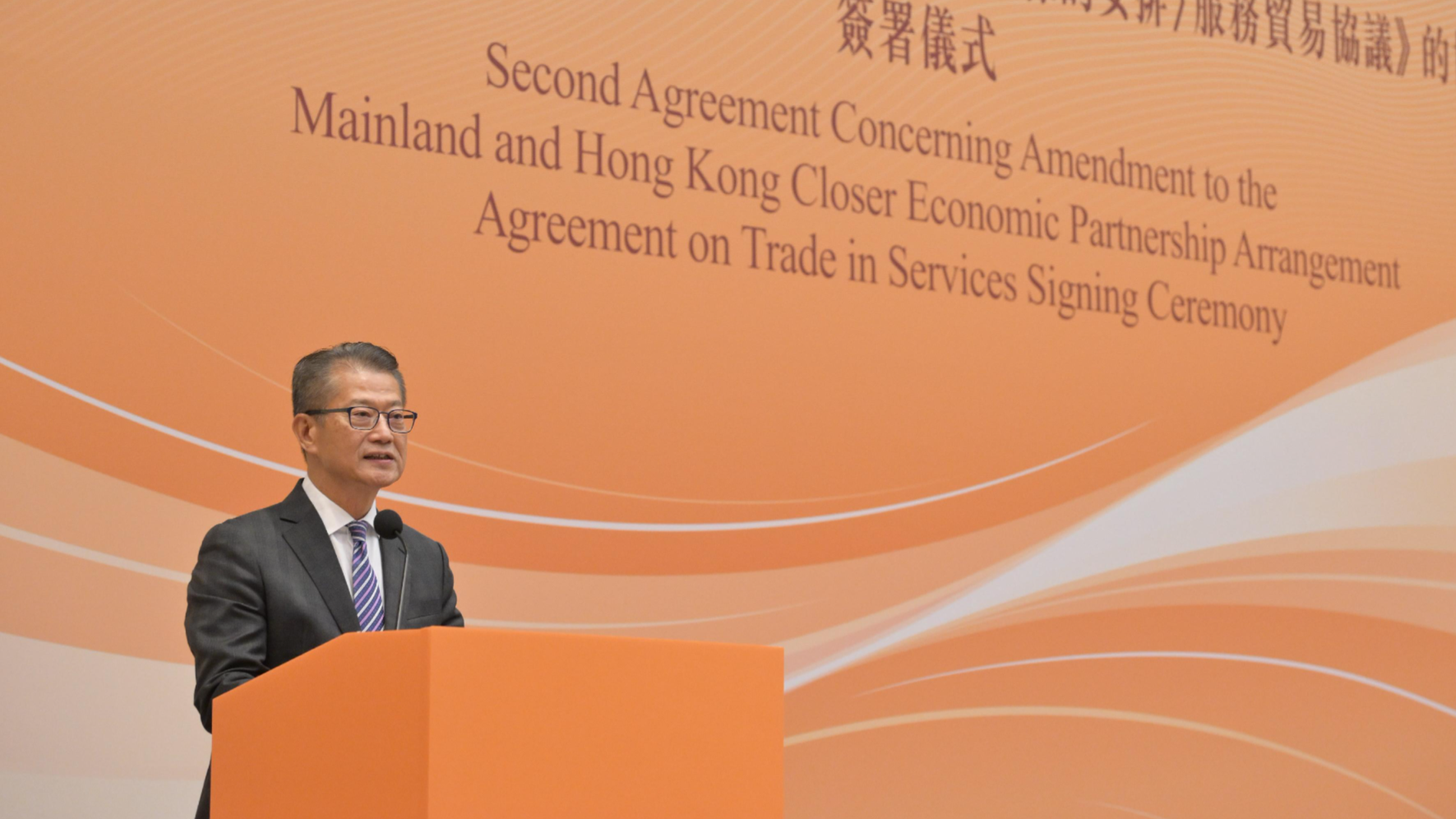
The recent amendment to a trade in services pact under the Closer Economic Partnership Arrangement will further strengthen the Hong Kong Special Administrative Region’s deepening economic and trade cooperation with the Chinese mainland and the world, Financial Secretary Paul Chan Mo-po said on Sunday.
Writing in his blog, Chan said the amendment will enhance the special administrative region’s competitiveness as a regional headquarters, boosting its roles as “superconnector” and “super value-adder”.
“It relaxes the entry threshold for Hong Kong-funded enterprises under CEPA, as well as the qualification requirements for professional services, such as finance and legal arbitration. More foreign-funded enterprises and professional service companies will choose Hong Kong as a base for entering the mainland market,” Chan said.
“By providing entry convenience for non-Chinese Hong Kong permanent residents, it will attract more overseas people to choose the SAR as their city of residence for entering the mainland.”
By helping more Hong Kong companies and professionals to enter the mainland market under more preferential treatment, the amendment will promote the flow of people, logistics and information in the Guangdong-Hong Kong-Macao Greater Bay Area, Chan said.
ALSO READ: Document provides impetus to HKSAR development
He added that it will also create greater business opportunities and growth for related service industries and professional service providers.
Chan noted that, under the new arrangement, requirement that Hong Kong financial institutions should have total assets of no less than $2 billion when investing in mainland insurance companies would be removed.
This will enable smaller financial institutions to enter the mainland insurance market, Chan said.
The changes also allow supporting Hong Kong-funded enterprises registered in the pilot cities of the Greater Bay Area to use Hong Kong law for contracts, and enable Hong Kong-funded enterprises registered in the Greater Bay Area’s nine mainland cities to choose Hong Kong as the seat of arbitration in resolving disputes.
The finance chief said this would consolidate Hong Kong’s position as an international legal and dispute resolution services center in the Asia-Pacific region.
ALSO READ: HKSAR, mainland ink deal to deepen services trade liberalization
“Foreign companies can thus prioritize Hong Kong as a base when exploring the mainland market, attracting investment and creating more jobs for Hong Kong,” he said.
The mainland and the HKSAR sealed the CEPA in 2003. The pact has steadily opened up convenient channels for various industries and enterprises in Hong Kong to enter the mainland market.
Both sides also signed the Trade in Services agreement in 2015 under the CEPA framework, with the first revision made in 2019, allowing further opening up in multiple areas.
The HKSAR government and the Ministry of Commerce signed the second amendment to the Trade in Services pact last week, allowing Hong Kong firms in the construction engineering, testing and certification, telecommunications, television, film, finance, and tourism services sectors to enter the mainland market with a lower market access threshold.
READ MORE: CE hails deal to deepen HK-mainland services trade liberalization
It will also benefit startups and foreign-funded companies established in Hong Kong as the three-year requirement for Hong Kong service providers to engage in substantive operations in the SAR in most fields has been scrapped.
The amendment also features two major enhancement measures for the tourism sector – the visa-free policy for foreign tour groups entering the mainland via Hong Kong to stay in Guangdong province for 144 hours was extended from the Pearl River Delta and Shantou City to the entire province, while the number of ports of entry covered by the visa-free policy was increased.
“With this optimization policy, Hong Kong’s tourism industry can develop more diversified ‘one-trip, multi-destination’ tourism products to attract more overseas tourists. Second, mainland tourists coming to Hong Kong on international cruise routes and calling at mainland ports can also conveniently enter the SAR,” Chan said.
"This will enable cruise companies to use Hong Kong as a base to develop more routes and promote cruise cooperation between Hong Kong and the mainland.”


